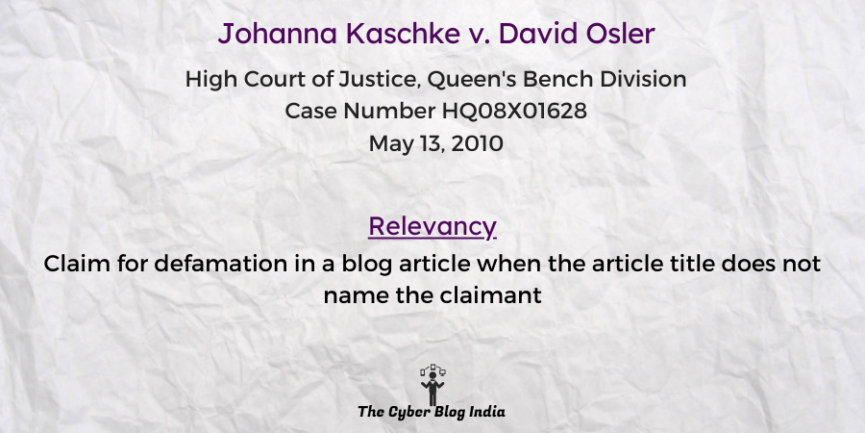Johanna Kaschke v. David Osler

Johanna Kaschke v. David Osler
[2010] EWHC 1075 (QB)
In the High Court of Justice, Queen’s Bench Division
Case Number HQ08X01628
Before Justice Eady
Decided on May 13, 2010
Relevancy of the Case: Claim for defamation in a blog article when the article title does not name the claimant
Statutes and Provisions Involved
- The Defamation Act 1996 (Section 8)
- The Limitation Act 1980 (Section 38(2))
Relevant Facts of the Case
- The defendant posted an article about the claimant. This article attracted a certain number of comments on it. The defendant is a journalist and an active member of the Labour Party.
- The post allegedly mentions the claimant’s connections with the Baader-Meinhof group, which she considers defamatory. She also replied to this post online.
- She faced false imprisonment earlier for three months. However, the article reflects the news at that time.
Prominent Arguments by the Counsels
- The claimant’s counsel argued that she had the right to reply when she posted her reply about the past. The counsel contended that the defendant’s claims rely on selecting individual selections from the material available on websites.
- The defendant’s counsel argued that the original defence was not satisfactory and that they ought to substitute a new amended defence. The counsel applied to strike out the claim as a whole, alleging abuse of power, and to confine any publication proved attributable to the defendant. The counsel argued that certain passages of the claim should be struck down as they lack any defamatory meaning. However, no substance would be gained from these proceedings by giving greater vindication of the claimant’s reputation.
Opinion of the Bench
- The blog post does not link the claimant to terrorism in any way. There are two considerations here.
- First, a reasonable reader should make an effort to read beyond the headline. Second, the article title does not name the claimant; hence, it is for the readers to understand unless they delve into the article.
- The linkage to Tony Blair relates to the other members of the Party with whom she was associated at that time, and it cannot be construed to suggest that she had any involvement in the political assassination.
- The claimant must demonstrate whether the defendant was responsible for the continued publication for the relevant 12 months.
- Nothing in the email exchanges supports the proposition of having a binding agreement against any claim she has.
Final Decision
- The defendant does not need to serve an amended defence. The court accepted the defendant’s submission that the passages are incapable of being actionable.
Ritesh Karale, an undergraduate student at Maharashtra National Law University, Mumbai, and Yagyanseni Acharya, an undergraduate student at VIT School of Law, Chennai, prepared this case summary during their internship with The Cyber Blog India in January/February 2024.
